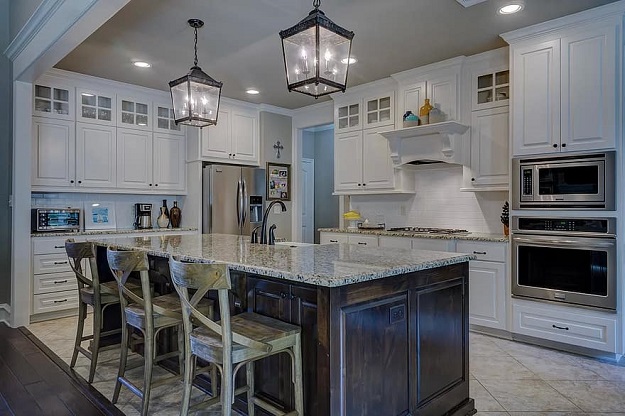Placing a price tag on your house for sale isn’t easy. Although your real estate agent will guide you through the process, ultimately, the decision on listing price is entirely up to you.
Here are some ideas to consider when pricing your house for sale.
Sentimental Value in Home Sales
Whether you’ve lived in your house for five years or 25, you’ve had experiences, made memories, climbed milestones, celebrated holidays, laughed, and cried, and may have built an emotional attachment to the property.

Before you decide on a price for your house, distance yourself emotionally, and consider the process as a business transaction.
Home Valuation Calculators Online
There are multiple sources online for getting a quick and easy estimate of what your house might be worth.
The problem with online valuation calculators is that they’re based strictly on data without considering the condition of your home or the community in which you live.
While you might get a ball-park figure based on current and outdated information, you won’t get the human factor, which makes a considerable difference.
To get an accurate idea of what your home is worth in the current market, talk with your real estate agent.
Find out instantly with our free home value calculator.
Buyers Market vs. Seller’s Market
The real estate market is fluid; it’s ever-changing based on a number of contributing factors.
Essentially, the market is split into two categories: a buyer’s market and a seller’s market. When you list your house for sale, it’s best to sell in a seller’s market.
A seller’s market means that there are only a few houses from which to choose, and too many house-hunters, which can escalate the sales price via competing bids.

On the contrary, a buyer’s market is when there are plenty of houses for sale and not many buyers competing. Sellers become more motivated to sell, which could drive the sales price down.
If possible, list your home in a seller’s market to increase the chances of selling your house quickly and for the most financial returns.
Talk with your real estate agent about current market conditions in your area.
Comprehensive Market Analysis
Your real estate agent will supply you with a report known as a Comprehensive Market Analysis, also referred to as a CMA.
A comprehensive market report gathers information about houses in your area that have recently sold.
The data includes information about homes that are similar to yours in size, style, features, and neighborhood.
With this information, you’re able to understand what buyers are willing to pay in your area, which influences your sales price.
If you price your house outside of the range of what buyers are willing to pay, you’ll find yourself reducing the price in the long run.
Tour Houses for Sale in Your Area
Only by visiting open houses and touring other homes for sale in your area can you get a genuine idea of how your house stacks up against the competition.

Other homes in your area may have been well maintained or may have been neglected. Maybe other houses have upgrades and features that yours doesn’t have — or vice versa.
Check out the neighborhood to know how many houses are for sale competing against yours.
Your Pricing Strategy
Many sellers have the strategy of starting the price at the top of the margin, and then reduce it if the house doesn’t sell quickly enough.
In a seller’s market, that strategy may work to a degree, but in a buyer’s market, you’ll find your listing going stagnant without any offers.
Another problem with aiming too high in the beginning is that each time you drop the price on your house for sale, it builds a stigma. After a few reductions, people begin to wonder what’s wrong with the property, why it isn’t selling.
The goal is to price your house competitively – not too high, not too low, but within the range that buyers are paying.
Trust your real estate agent’s advice, along with the comprehensive market report, to begin to formulate an idea of what your house may be worth.
Tips for First-Time Home Buyers
How Staging Affects Home Values
Staging your home is the art of getting it in pristine condition for showing. This means decluttering, depersonalizing, deep cleaning, neutralizing, and accentuating the space.
There are also minor upgrades you can make that can increase the perceived value of your home and possibly raise your appraisal.

Small things like changing out light switch plate covers, window screens, and doorknobs can give the home a refreshed look and indicate that it’s been well maintained.
When you sell your home, the buyer’s lender will require an appraisal. Appraisers typically work in $500 increments, so an investment of $100 in upgrades could result in a slightly higher estimate.
Your real estate agent is an expert at staging and can provide you with a checklist of things you may want to work on before listing the house for sale.
Listing Appraisal
You have the option to obtain a listing appraisal before you price your house for sale. While you won’t be able to use a listing appraisal as a formal appraisal for the lender, it will give you a solid idea of the value of your home in the current market.
An appraiser assesses the age and condition of the house, property, and neighborhood. He or she also relies on a comprehensive market report to compare your home to other houses in the area.
You can, however, use the listing appraisal as a marketing tool to show potential buyers the home’s recent assessment.
Ask your real estate agent if a listing appraisal would be helpful.
Conclusion
Your real estate agent will walk you through the process of determining a price for your property, but the final decision is yours. To help you better make that decision, there are things to consider when pricing your house for sale.
Detach emotionally from the property before you list it for sale without adding sentimental value to your home’s sales price.
You can use a home valuation calculator as a jumping-off point, but not as a resource you can trust. Those estimates can be off by thousands of dollars.

Understand the difference between a buyer’s market and a seller’s market, and rely on the CMA to inform you about what people are paying for residential real estate in your area.
Tour homes in your area so you can see first-hand what you’re up against and how those houses measure up to yours, as well as what the owners are selling it for.
Be careful not to price too high as this can cause a stigma and hurt your efforts, or too low as you’ll surely lose money. Aim for the middle ground by pricing competitively from the beginning.
Stage your home so that potential buyers can see your house in its best form, move-in-ready.
If you’re still not convinced of the list price for your property, consider a listing appraisal to get an understanding of your home’s value in the current market.
Above all, trust your real estate agent. Your agent can provide you with the CMA, advise you on staging, and, from experience and knowledge of your community, can help you set a price on your house that will help it sell quickly and for the most money.




